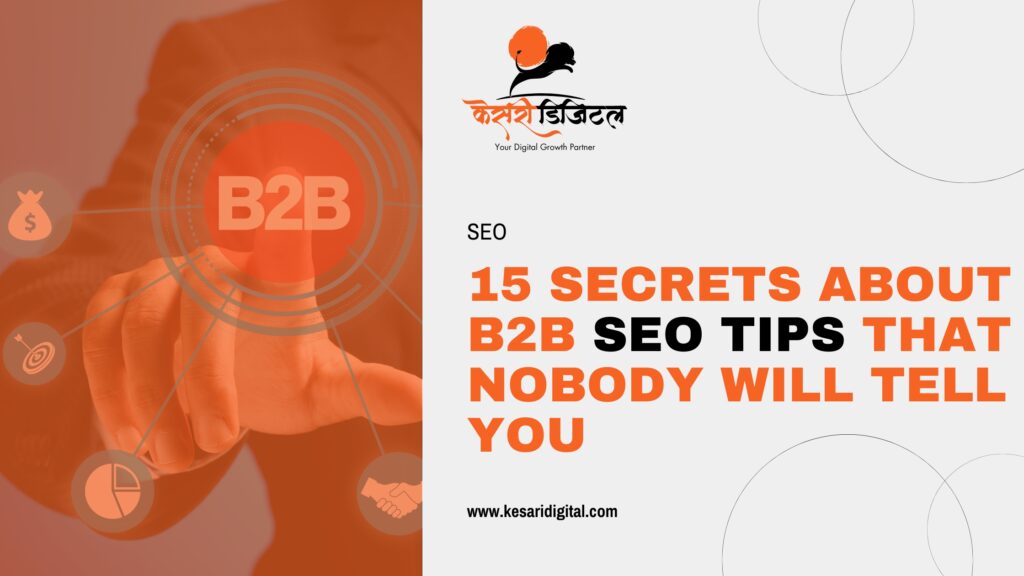Blog
Insights and Innovations: Navigating the Digital Frontier with KesariDigital
15 Secrets About B2B SEO Tips That Nobody Will Tell You

15 Secrets About B2B SEO Tips That Nobody Will Tell You
Introduction
In the realm of digital marketing, understanding the subtleties of B2B (business-to-business) SEO is crucial for standing out in a crowded marketplace. Unlike B2C SEO, which targets individual consumers, B2B SEO focuses on meeting the needs of other businesses. This article unveils 15 secrets about B2B SEO tips that remain largely untold, offering you an edge in crafting a robust SEO strategy.
The Essence of B2B SEO
Understanding Your B2B Audience
Grasping the complexities of your B2B audience is foundational. Businesses searching for solutions have specific needs, requiring content that addresses these needs directly. Tailoring your SEO strategy to these requirements ensures higher engagement and conversion rates.
The Role of Quality Content in B2B SEO
Content is king, especially in B2B marketing. Quality content that educates and informs potential business clients establishes your brand as an authority in your industry, encouraging trust and long-term relationships.
Keyword Strategy Hidden Gems
Long-Tail Keywords for B2B
Long-tail keywords are less competitive and more specific, making them ideal for targeting niche B2B audiences. These keywords often reflect the specific, solution-oriented search intent of business customers.
The Power of Niche-Specific Keywords
Niche-specific keywords can drive highly targeted traffic to your site. Focusing on keywords unique to your industry can attract businesses actively seeking your specific services or products.
On-Page SEO Secrets for B2B
Meta Descriptions That Convert
A well-crafted meta description acts as an ad for your webpage. For B2B audiences, clear, benefit-focused meta descriptions can significantly improve click-through rates.
Headings and Subheadings Optimization
Organizing content with clear headings and subheadings improves readability and provides an SEO advantage. Utilizing relevant keywords in these headings can enhance your search engine visibility.
Technical SEO: The Backbone of B2B Success
Site Speed Optimization
Site speed is a critical factor for keeping potential B2B clients engaged. Fast-loading pages reduce bounce rates and improve overall user experience, factors that Google considers when ranking websites.
Mobile-Friendliness
With the increasing use of mobile devices in business environments, having a mobile-friendly website is essential. Mobile optimization ensures accessibility and a positive experience for users on any device.
Secure Sockets Layer (SSL)
SSL certification not only secures your website’s connection but also contributes to building trust with your B2B audience. Google favours secure websites, making SSL certification a critical factor in SEO rankings.
Quality Content: More Than Just Words
Creating Value-Driven Content
In B2B SEO, the content must solve problems. You can effectively engage a professional audience by creating value-driven content, such as case studies, whitepapers, and how-to guides.
The Role of Video and Podcasts in B2B SEO
Integrating video content and podcasts into your B2B SEO strategy can significantly enhance engagement. These formats are excellent for explaining complex solutions in an accessible manner.
Link-Building Strategies No One Talks About
Guest Blogging With a Twist
Guest blogging on reputable industry sites can boost your SEO, but with a twist—focus on creating content that addresses new insights or provides unique value to the audience rather than just self-promotion.
Leveraging Industry Partnerships
Building links through industry partnerships can be incredibly effective. Collaborate on content, webinars, and case studies to naturally build high-quality backlinks to your site.
Local SEO for B2B: An Overlooked Treasure
Optimizing for Local Searches
For B2B businesses serving specific regions, local SEO is crucial. Optimizing for local search terms and listings can drive targeted traffic and enhance visibility among local companies.
Google My Business for B2B
A well-optimized Google My Business listing can significantly boost your B2B company’s visibility in local search results, making it easier for nearby businesses to find and contact you.
Social Media Integration into B2B SEO
Leveraging LinkedIn for B2B
LinkedIn is a powerhouse for B2B networking and marketing. Integrating your SEO efforts with LinkedIn can drive traffic, enhance your brand’s authority, and foster professional relationships.
The Role of Twitter and Facebook
While LinkedIn is the primary platform for B2B, don’t overlook the potential of Twitter and Facebook. These platforms can support your SEO efforts by increasing content visibility and engagement.
User Experience (UX) and Its Impact on B2B SEO
Website Navigation
Simple, intuitive website navigation is essential for a positive user experience. A well-structured site helps users and search engines find information easily, improving your SEO performance.
Call-to-Action (CTA) Strategies
Effective CTAs are critical in converting website visitors into leads. For B2B websites, clear, compelling CTAs that guide users to the next step in their journey can significantly impact conversion rates.
B2B SEO Analytics and Performance Tracking
Tools for Tracking SEO Performance
Utilizing tools like Google Analytics and SEMrush can provide insights into your SEO performance, allowing you to make data-driven adjustments to your strategy.
Interpreting Data for SEO Strategy Adjustments
Regularly reviewing your SEO performance data helps identify what’s working and what isn’t. This continuous improvement cycle is critical to staying ahead in the competitive B2B market.
Advanced B2B SEO Techniques
Voice Search Optimization
With the rise of voice search, optimizing your content for voice queries can give you an edge. Focus on natural language and question-based keywords to cater to voice search users.
Artificial Intelligence in SEO
AI and machine learning are becoming increasingly important in SEO. Leveraging AI for keyword research, content optimization, and user experience can significantly boost your B2B SEO efforts.
Content Marketing Synergy with B2B SEO
Aligning Content Marketing with SEO Goals
Content marketing and SEO should work hand in hand. Align your content creation with SEO goals to ensure maximum visibility and engagement from your target B2B audience.
The Importance of Consistent Publishing
Regularly publishing high-quality content is crucial for SEO success. A consistent publishing schedule keeps your audience engaged and signals to search engines that your site is a valuable resource.
Standard B2B SEO Mistakes to Avoid
Ignoring Search Intent
Failing to align your content with the search intent of your B2B audience can lead to missed opportunities. Understanding and addressing the specific needs of your audience is vital to effective SEO.
Underestimating the Power of Testimonials and Reviews
Testimonials and reviews are powerful tools for building trust and credibility. Incorporating these elements into your B2B website can positively impact your SEO by demonstrating the value of your offerings.
15 Secrets About B2B SEO Tips That Nobody Will Tell You
Incorporating these secrets into your B2B SEO strategy can transform your digital marketing efforts. Each tip offers a unique opportunity to enhance visibility, engage your target audience, and drive business growth.
FAQs
How does B2B SEO differ from B2C SEO?
B2B SEO and B2C SEO differ primarily in their target audiences and the strategies used to engage these audiences. B2B SEO targets other businesses, focusing on long sales cycles, niche markets, and specific industry needs. It emphasizes creating content that addresses detailed, professional concerns, offering solutions to complex business challenges. On the other hand, B2C SEO targets individual consumers, emphasizing emotional engagement, broad appeal, and immediate solutions. B2B SEO strategies often involve more detailed keyword research, a focus on lead generation, and content that fosters informed decision-making. At the same time, B2C SEO leverages emotional triggers and broader keywords to drive quick purchases.
Why is keyword research significant for B2B SEO?
Keyword research is crucial for B2B SEO because it helps identify the specific terms and phrases that potential business clients use when searching for products or services. This process enables marketers to tailor their content and SEO strategies to match the search intent of their target audience, ensuring higher visibility in search engine results. Given the complex nature of B2B transactions and the niche markets involved, precise keyword research allows targeting particular queries, leading to more qualified traffic, better lead generation, and, ultimately, higher conversion rates. It also helps in understanding the language and concerns of industry professionals, ensuring the content is relevant and engaging.
What role does content play in B2B SEO?
Content is central to B2B SEO, serving as the foundation for establishing authority, building trust, and engaging with potential business clients. High-quality, informative content that addresses specific industry challenges, offers solutions, and provides value to readers is essential for attracting and retaining the attention of business audiences. This type of content improves SEO rankings by incorporating targeted keywords and helps generate leads by demonstrating expertise and credibility. Content formats such as blog posts, whitepapers, case studies, and how-to guides are particularly effective in B2B SEO, as they cater to the information-seeking behaviour of professionals and decision-makers.
How can social media be used effectively in a B2B SEO strategy?
Social media can be effectively used in a B2B SEO strategy by promoting content, increasing brand visibility, and engaging directly with other businesses and industry influencers. Platforms like LinkedIn are invaluable for B2B companies, as they allow for sharing industry-related content, participation in professional groups, and networking with potential clients and partners. Social media can also drive traffic to a company’s website, boosting SEO efforts. By sharing valuable content, companies can enhance their reputation as industry leaders and foster relationships, leading to increased backlinks and improved search engine rankings.
What are some common pitfalls in B2B SEO strategies?
Common pitfalls in B2B SEO strategies include neglecting the specific search intent of business clients, underestimating the importance of content quality, and failing to optimize for mobile and local search. Ignoring the technical aspects of SEO, such as site speed and security, can also negatively impact rankings and user experience. Additionally, overlooking the power of analytics to refine and adjust strategies based on performance data can lead to missed opportunities for improvement. Relying too heavily on broad keywords instead of focusing on niche, long-tail keywords can result in lower visibility among the intended audience. Avoiding these pitfalls requires a strategic approach that prioritizes the unique needs and behaviours of the B2B market.
How often should B2B SEO strategies be reviewed and adjusted?
B2B SEO strategies should be reviewed and adjusted regularly, ideally every quarter, to ensure they remain effective and aligned with changing market trends, search engine algorithms, and business objectives. However, monitoring key metrics and performance indicators should be ongoing, allowing for more immediate adjustments as needed. This approach ensures that SEO efforts are responsive to the evolving online landscape, competitive dynamics, and the business’s specific goals. Regular reviews and adjustments help identify new opportunities, address emerging challenges, and continuously optimise the strategy for maximum impact.
Conclusion
This article’s secrets about B2B SEO tips can provide a competitive advantage in ness-to-business marketing. Implementing these strategies requires a deep understanding of your audience, a commitment to quality content, and a willingness to embrace the ever-evolving landscape of SEO. By focusing on these critical areas, you can achieve greater visibility, engagement, and business success in the B2B sector.

